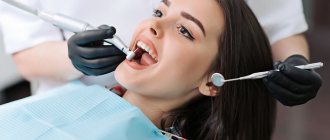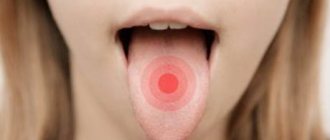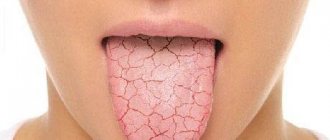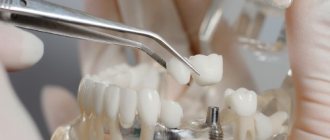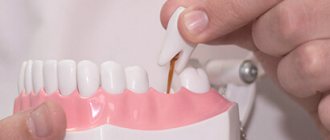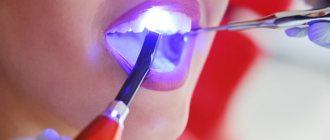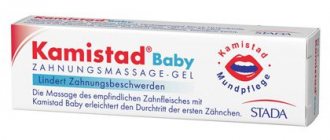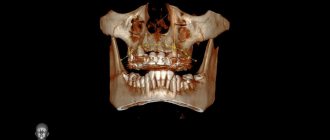Hundreds of pages on the Internet give very “useful” advice on how to get rid of toothache and cure caries with folk remedies. Do you carefully study such pages, memorize all the advice, and also take notes on the particularly tricky ones? When you have a toothache, is it easier for you to read a spell for the waxing moon, kiss a live toad at midnight and rinse your mouth with a decoction of urine from a five-month-old baby, rather than go to the dentist? Then it’s time for you to find out that there is dentistry without pain, that in a modern clinic absolutely painless treatment of caries is possible, and a good doctor will do everything possible to make you feel, if not at home, then at least not like in a torture chamber in the dental chair.
Some people have such a serious fear of dental treatment that they are ready to endure the pain until the last moment, put up with tooth decay and come to the doctor only when the pain is not relieved by any analgesics and because of it the fear is temporarily dulled. Unfortunately, with such a late application, all that remains is to remove the diseased tooth, and the person leaves the clinic happy (he got off easy, he didn’t even have to treat!) and disappears from the dentists’ field of view until the next time - when the next diseased tooth has to be removed. Doctors can tell many stories about relatively young people who were left with practically no teeth, but did not even try to at least replace the lost dental units with a prosthesis, since they could not save theirs. And this is despite the fact that today there are many methods of prosthetics without grinding teeth, which is usually the most feared.
It would be stupid to reproach and shame a person for something for which he is not to blame - after all, none of us fully knows how to control our fears. Therefore, we will neither cause a feeling of guilt nor put pressure on a sense of responsibility. We will simply tell you what methods of painless dental treatment exist today and how you can make up your mind and finally trust the dentist.
Pain-free dentistry: protect and prevent
It is much easier to prevent any disease, including dental disease, than to then deal with the consequences: competent prevention will help protect yourself from both caries and periodontitis, which means you will not have to deal with the need for treatment. But good home hygiene alone is not enough for prevention. The best way to protect yourself from dental diseases is to have your teeth professionally cleaned. A simple, absolutely painless and comfortable procedure will not take much time, but will remove all plaque and tartar, which usually cause caries.
Ultrasonic tartar cleaning, laser tartar cleaning and Air-Flow - all these modern techniques do not require anesthesia, because they involve a very soft, gentle effect on the dental surfaces and do not cause any discomfort. Carrying out ultrasonic or laser removal of tartar once every six months will reliably protect your teeth and gums from diseases, which means there will be no reason to go to the dentist for treatment.
Dental hygienist at the 32 Dent clinic, Varivoda Violetta Vladimirovna, says: “Modern teeth cleaning is not at all similar to removing tartar with metal dental instruments, which was practiced 10-20 years ago. Today, hard and soft plaque is removed very carefully, accurately and completely painlessly. For example, laser cleaning of teeth from stone occurs very quickly and is almost unnoticed by the patient. Even our most “fearful” patients feel quite comfortable when undergoing such a procedure.”
How does intravenous sedation differ from inhalational sedation?
- intravenous sedation – deeper, in which individually selected sedatives are administered intravenously, and the patient is immersed in a state of sleep (or half-asleep). Read about this type of pain relief in a separate article.
- inhalation sedation - the patient inhales a certain drug, but remains conscious, that is, reflexes are dulled, complete relaxation occurs and anxiety is relieved.
Intravenous sedation is used as an independent means of pain relief. But inhalation xenon often precedes other types of anesthesia. Since it does not have an analgesic effect, but is aimed at reducing the level of anxiety, local anesthesia (infiltration or conduction anesthesia) is additionally used, and less often, intravenous sedation. In the second case, xenon therapy is required for general stress relief before the upcoming treatment.
Laser dental treatment
The latest laser systems have become firmly established in today's medicine; they are also successfully used in dentistry. Laser dental treatment is an opportunity to quickly, and most importantly - without the slightest discomfort and generally without pain, treat caries in the initial stages, treat gum diseases, and carry out whitening and hygiene procedures. The laser has become a real salvation for those people who are afraid to have their teeth treated, because it allows them to undergo treatment without experiencing any fear or pain, even without anesthesia.
A laser beam can be used instead of the notorious dental drill, the mere mention of which may be unpleasant for you - the laser successfully and very carefully removes areas of the tooth affected by caries, while simultaneously disinfecting dental tissues. It is also used instead of a scalpel during implantation, as well as some other dental operations. Unlike a scalpel, the laser beam acts bloodlessly, very accurately and painlessly, while ensuring complete sterility of the surgical field.
Dentist at the 32 Dent clinic Andrey Andreevich Koloskov says: “Our clinic uses the latest laser systems, the work of which many of our patients have already been able to evaluate. Yes, laser dental treatment is more expensive than usual, but for those people who are not too fond of being treated by dentists, it is optimal. Anesthesia is usually not required for this treatment because it does not cause any pain or discomfort.”
Can an injection be painless?
Patients often have a fear of anesthesia injection. To reduce discomfort, ILATAN dental doctors:
- Use special syringes with very thin needles;
- Dry the mucosal area before injection to facilitate the passage of the needle;
- Lubricate the injection sites with anesthetic gel;
- The medicine is administered gradually.
Icon: caries treatment without preparation
In the early stages of caries, Icon dental treatment is successfully used when drilling is not required at all. Dental surfaces are treated with a special chemical composition, which, permeating the tissues, disinfects and seals them. Essentially, a special filling is placed on the tooth, but you don’t have to drill into it for this filling. Unfortunately, treatment of caries without Icon preparation can only be used at the beginning of the development of the disease, when there is not yet a deep cavity in the diseased tooth. Therefore, for those who want to be treated quickly and painlessly, without an unpleasant preparation procedure, it is better to consult a doctor at the first signs of caries.
Veronika Aleksandrovna Ivantsova, dentist at the 32 Dent clinic: “The Icon dental treatment today is the most famous and popular technique that does not require drilling of dental tissue. But besides this, there are other technologies without preparation: ozone therapy, when diseased cells are removed by ozone cleaning, a non-contact abrasive technique, which is very similar in its mechanism of action to regular teeth brushing. In a modern, well-equipped clinic, the patient can always be offered a choice of several options for painless and completely comfortable treatment.”
PiezoSurgery® – ultrasound surgery
We work with bone tissue and remove teeth using a minimally invasive piezosurgical protocol
- Minimal trauma - the bone is not damaged, it is delicately softened
- The device affects only hard tissues, damage to the sinus membrane is excluded during sinus lifting
Modern anesthesia in dentistry
For people who are afraid to have their teeth treated, it can be very difficult to decide and go to the doctor on time, while the disease is still at an early stage. As a rule, they wait until the last minute, postponing from one day to the next, until the pain forces them to finally “surrender” to the dentist. The situation is familiar to you, isn't it? But the fear still doesn’t go away, and sometimes, under the influence of this fear, already at the very door of the dental office, the pain disappears somewhere, and there is a great temptation to turn around and leave without ever getting an appointment.
If you have a problem similar to that described in this article, be sure to contact our specialists. Don't diagnose yourself!
Why you should call us now:
- We will answer all your questions in 3 minutes
- Free consultation
- The average work experience of doctors is 12 years
- Convenient location of clinics
Single contact phone number: +7
Make an appointment
But is it worth being afraid, especially if the tooth already hurts and, as you yourself know, in the future it will only hurt more and more persistently? It’s better to be brave and entrust your poor, bad teeth to the doctor. Moreover, modern anesthesia in dentistry will make it possible for you to feel neither pain nor the treatment itself. High-quality anesthetics will numb any tooth, even the most “harmful and unruly” one, quickly and very reliably.
Are you afraid of injections? It’s also not a problem - you can ask the doctor to do a preliminary application of anesthesia. The gums are lubricated with an anesthetic in the form of a gel or spray, and after a few minutes they become insensitive. For minor interventions, this is quite enough, but if “more serious” pain relief is required, you can also give an injection - after all, the gums have already lost sensitivity, and you will not feel pain from the injection.
But it also happens that any reasonable arguments fade where a real fear of treatment and injections comes into force - in this case, the patient can simply refuse treatment and pain relief, already sitting in the chair. What to do in this case? Sedation can help here - the newest method that allows you to get rid of pain, fear and other negative emotions at the same time. Intravenous sedation is similar in effect to anesthesia, only it acts more mildly, has far fewer contraindications and can be successfully used by both adults and children. There is also sedation with nitrous oxide (when a nitrogen mixture is inhaled through a mask). This type of sedation does not turn off the consciousness, it simply helps to relax, completely remove fear and calmly endure any dental procedures - both the anesthetic injection and the treatment itself.
Dentist-therapist at the 32 Dent clinic, Ekaterina Romanovna Vysochanskaya, says: “In the last decade,
pain management in dentistry has entered a new stage of development; today these are very affordable, safe and extremely reliable ways to relieve the patient of the slightest signs of pain, as well as discomfort during the treatment process teeth. An experienced doctor will always make sure that the patient is not afraid of either the anesthesia itself or the dental procedures that follow it.”
When not to use local anesthesia
Anesthetics injected into the gums should not be used if the patient is allergic to them. They are also prescribed with extreme caution to persons who have diseases of the cardiovascular system, thyroid gland, or diabetes. In all these cases, complex dental interventions are carried out strictly in a hospital setting.
Before administering an anesthetic, the patient must tell the doctor what acute or chronic diseases he has. This will allow the doctor to make the right decision at the stage of choosing a method of pain prevention.
Terrible drills are a thing of the past
The notorious drills, which with their sound could scare away all patients waiting for an appointment, and with the “elegance” of their work resembled a jackhammer, are a thing of the distant past. Today, dental clinics are equipped with modern, completely silent units that do not get on the nerves of patients with unpleasant buzzing and disgusting vibration. Even if the patient has to drill a tooth, today this can be done without noise or discomfort. Agree that the lion's share of hostility to dental treatment was formed precisely because of the fear of treating teeth with a disgustingly noisy “dental jackhammer.” Now that the likelihood of encountering an old-generation drill has been reduced to almost zero, you can go to the dentist with confidence and confidence.
Other equipment in dental clinics has also changed. Today, treating teeth has become much more pleasant and convenient than just 10 years ago. And technologies are constantly developing: new, comfortable, painless solutions appear. Today, prosthetics are not at all as uncomfortable and time-consuming as they used to be. It is quite possible to install a prosthesis without grinding the teeth, and implantation has reached such a high level that the degree of difficulty for the patient is similar to a regular tooth extraction.
But, of course, it’s better not to resort to prosthetics - if you pull yourself together from time to time and still visit the dentist for treatment, there is every chance of meeting old age with your own teeth.
Dentist at the 32 Dent clinic Mukhin Pavel Nikolaevich: “As paradoxical as it may sound, a person who is afraid of dental treatment needs to go to the dentist much more often than a “fearless” patient. Regular visits to the doctor will help to identify caries in time and cure it when neither drills nor dental pulp removal and canal cleaning are needed. Professional hygiene and annual medical examinations will help you maintain your dental health at a decent level and save yourself from serious dental treatment.”
Injuries
Dental injuries are not uncommon. As our practice shows, children (sports, games) and representatives of the stronger half (incidents at work, car accidents) most often suffer from them. If you are injured, you should seek help as soon as possible - this will both reduce the cost and simplify recovery practice.
We strongly recommend making an appointment with your dentist in the following cases:
- after mechanical damage, the tooth began to become loose (trying to strengthen it yourself with different types of rinsing is inappropriate, it can provoke accelerated loosening or cause an infection);
- as a result of the impact a chip appeared;
- the coronal part is broken off completely (down to the root).
Modern methods of dental treatment make it possible to preserve all healthy tissue even with severe chips and significant defects. Restorative practice can be long-term (if soft tissue is damaged) and quick (restoration, veneers). The sooner a problem is diagnosed, the less effort it can take to solve it.
How does xenon sedation work?
All manifestations occur within the first five minutes after gas supply. If the patient experiences discomfort, the procedure can be interrupted immediately. This is a great advantage of inhalation sedation - the use of this method can be limited to a few minutes, which allows treatment of only 1-2 teeth.
Smile-at-Once clinics have installed specialized equipment for the inhalation supply of medical xenon “XeMed”. The procedure is carried out under the constant supervision of a doctor who has been trained to operate the appropriate equipment and has the necessary certificates and qualifications.
The doctor puts a mask on the patient and holds it on his face. Xenon is supplied for 5-6 minutes at the beginning of treatment and for 10 minutes towards the end.
Is it somewhat safe?
- This procedure is completely safe for the body: xenon is inert, non-toxic and is completely eliminated through the lungs within 4 hours,
- there is a rapid restoration of consciousness - within 2-3 minutes after the end of the drug administration,
- pronounced analgesic effect, while the patient is conscious and can communicate with the doctor,
- There is practically no drug load on the heart, blood pressure remains normal,
- compatibility with any medications and anesthetics,
- ideal for both time-limited procedures (for example, treatment of one tooth) and long-term manipulations (for example, installation of a large number of dental implants).
In our clinics, treatment using xenon is carried out by professional doctors who have undergone appropriate training and are accredited. In addition, modern equipment is used for safe sedation. It is mandatory to diagnose the patient’s health condition and his individual characteristics in order to select the permissible dose of the drug. The operating rooms are equipped with a ventilator and a resuscitation kit, which are mandatory when carrying out such manipulations.
